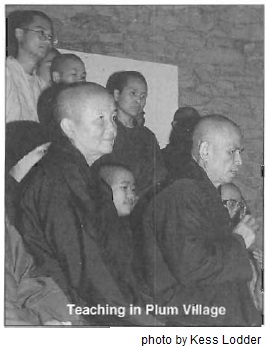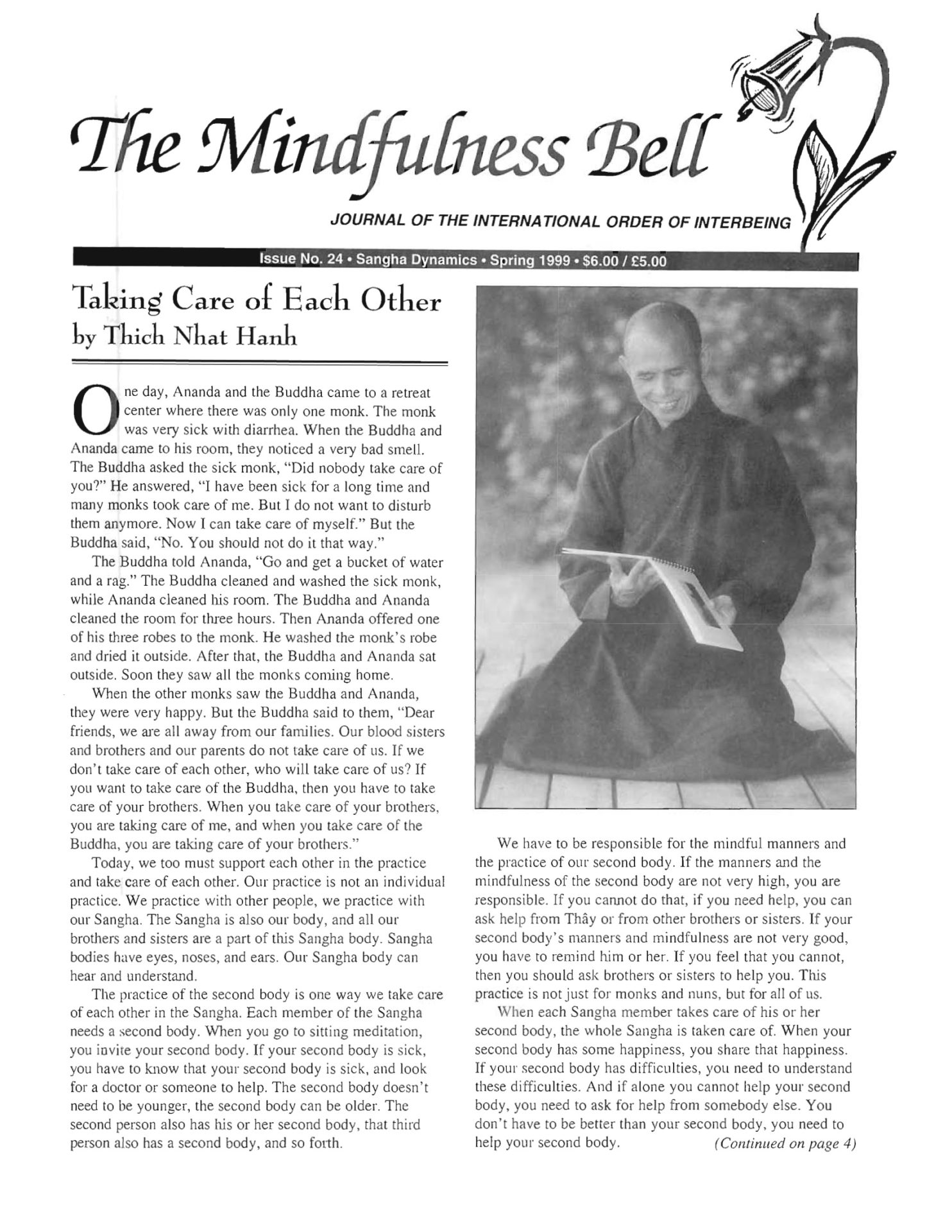By Brother Chan Phap An
Thich Nhat Hanh has taught and led retreats all over the world. Thousands of people have profited from his teaching. But, for over thirty years, he has been unable to return home and teach in Vietnam. Many people-Vietnamese in Vietnam and abroad, as well as Western friends and students-ask, “When will the people of Vietnam have a chance to learn and practice with Thay?”

For more than two years,
By Brother Chan Phap An
Thich Nhat Hanh has taught and led retreats all over the world. Thousands of people have profited from his teaching. But, for over thirty years, he has been unable to return home and teach in Vietnam. Many people-Vietnamese in Vietnam and abroad, as well as Western friends and students-ask, "When will the people of Vietnam have a chance to learn and practice with Thay?"

For more than two years, quiet diplomatic efforts have been made so that Thay might go home and teach, but the efforts have not borne fruit. The government of Vietnam will only allow Thay to visit, stay in hotels, and give small Dharma talks exclusively in temples, with permission from the Buddhist Church of Vietnam (BCVN). Thay cannot accept these conditions.
During the Assembly of Buddhists in Hue, Le Quang Vinh, Chairman of the Governmental Committee of Religious Affairs, declared, "The BCVN is the only legal organization of Vietnamese Buddhists in Vietnam. All individuals and organizations acting in the name of Buddhists outside of the BCVN are illegal and must be eliminated." In the history of Vietnamese Buddhism, no church organization has ever controlled the activities and practice of all Buddhists. BCVN does not represent all Vietnamese Buddhists.
The Unified Buddhist Church of Vietnam (UBCVN) was established after the fall of President Ngo Dinh Diem in 1963. Although outlawed by three consecutive governments, UBCVN is still alive in the hearts of many Vietnamese Buddhists. Thay appreciates his brotherhood with the monks who are skillfully working in BCVN. He also respects and treasures his friendship with the monks who support the UBCVN. To accept the government's condition that he seek permission of the BCVN, Thay must acknowledge that it is the unique representative of all Vietnamese Buddhists. He cannot betray his friends in the UBCVN this way. If Thay's return to Vietnam could provide the opportunity for both sides to be together, Thay would go, but he cannot return under conditions likely to cause disharmony among brothers.
Further, if Thay goes to Vietnam, he and his monastic delegation from Plum Village must be allowed to stay in Buddhist temples, not forced to stay in hotels. Twice, monks and nuns from Plum Village visiting the root temple in Hue were forced to stay in hotels. They were allowed to visit the temple a few hours each day, but prohibited from spending the entire day. They were also forbidden to practice sitting and chanting with the temple Sangha. Never in Vietnamese history have monks and nuns been forced to stay in hotels rather than temples-not even during the most dictatorial and feudal times. If Thay and hi Sangha are allowed to stay in the temples, future visiting monks and nuns might also be allowed to stay in temples, and that would be one step toward freedom.
The restrictions on where Thay may teach are also unacceptable. Thay has taught in many different venues all over the world-Dharma centers, cathedrals, churches, monasteries, retreat centers, university gymnasiums, theaters, community centers, public halls, and even a golf course. But the government of Vietnam forbids monks and nuns from teaching outside temples. Although many Vietnamese people wish to hear Thay, because he is a monk the government will not allow him to speak in the Palace of Culture in Hanoi, the Cultural House in Hue, or Hoa Binh Theater in Saigon. Many lay scholars, artists, and performers-Vietnamese and non-Vietnamese-have been allowed to lecture and perform in these places.
The government's prohibition denies monks and nuns full citizenship, and is an injustice. If Thay is allowed to lecture freely, then other venerable monks will also have this right. That would be another step toward freedom and full citizen rights for monks and nuns in Vietnam.
The government's animosity toward Thay is clear. On October 28-30, 1998, the Fatherland Front (Mat Tran To Quoc) and the Governmental Committee on Religious Affairs summoned 250 abbots in the neighborhood of Saigon Gia Dinh to discourage their enthusiasm for welcoming Thay. The authorities stated that Thay is antirevolution, anticommunist, and antigovernment, and only seeks to return so he might open the way for other anticommunist monks, such as Venerables Tam Chau and Man Giac, to return.
Thay's work is still suppressed in Vietnam. His books and tapes are banned and confiscated. Twice recently, arrangements were made for Thay to give a telephone Dharma talk to student monks in his root temple, but each time, the telephone lines were cut. Teaching materials sent to the temple by fax machine are confiscated, a request to allow his root temple in Hue to publish ten of Thay's books has not been answered, and an application to build a library at the temple was rejected. Thay's books and tapes are only Dharma talks, offering Buddhist teaching and practices of healing, transformation, and reconciliation. When Thay's books, tapes, and talks are treated this way, how can we be sure that Thay himself will be treated differently and not simply arrested upon his return?
The government's animosity toward Thay is evident in other ways as well. Monks and nuns traveling abroad must have the approval of the BCVN and the Governmental Committee on Religious Affairs-Iaypeople do not need this approval. Permission to visit Plum Village is always refused. Monastics who travel to France for tourist, family, or medical reasons, must promise the police they will not go to Plum Village.
In preparation for his visit, Thay also would like a number of his books to be published, announcements to be made about lectures and retreats he will offer, and an office of Plum Village be allowed to set up in the Dinh Quan Temple in Hanoi to make arrangements for his teaching. The office should be allowed to contact monastics and laypeople for necessary help preparing for events.
Thay wishes to invite friends and the press to accompany him to Vietnam. These observers would report to the world whether there is freedom of teaching in Vietnam. Several people, including French Senator Bernard Dussaut, have written to the government of Vietnam expressing the wish to accompany Thay.
The campaign for Thay's return to Vietnam was not initiated by Thay, but by friends in Europe and North America. These influential friends have campaigned skillfully with the Vietnamese government, through Prime Minister Phan Van Khai and Minister of Foreign Affairs Nguyen Manh Cam. French Senators Jean Francois Poncet, Bernard Dussaut, and Phillipe Marini have written letters to the government of Vietnam. On November 9, 1998, Swiss President Flavio Cotti wrote the Prime Minister: ''Thich Nhat Hanh had to leave his country 34 years ago because of his commitment to the cause of peace. He has since become one of the best-known and most respected Vietnamese citizens in the world. It is my belief that the peaceful teaching of Thich Nhat Hanh does not conflict with your country's interests."
On March 24, 1998, United States Senator John McCain also wrote Prime Minister Phan Van Khai:
I understand that Thich Nhat Hanh, a Buddhist monk and scholar living in France, has felt unable to return to Vietnam since he left his war-torn country many years ago. Although I have never met him, my friends tell me that he is an enlightened man whose regard for peace and social justice endears him to those who know him. Indeed, American civil rights leader Dr. Martin Luther King, Jr. once nominated him for the Nobel Peace Prize-a high honor indeed for a monk of such renowned humility.
Thich Nhat Hanh is known to be an apolitical leader whose intellectual capacity and spiritual depth would serve his fellow Vietnamese well, should he be permitted to return to his country. Although I am unable to travel to Vietnam personally, a group of friends led by Bruce Morrison, my former colleague in the House of Representatives, is interested in accompanying Thich Nhat Hanh to Hanoi in the hopes of conducting a dialogue with your government.
A number of United States Congressmen, including Representative Rick Boucher, have even visited Vietnam to ask government officials to allow Thay to go home and teach. On July 9,1998, Congressman Boucher and a delegation of the Buddhist Committee on Dialogue and Understanding, composed of Thich Chan Phap An and Pritam Singh, went to the Vietnamese Embassy in Paris. They submitted a formal request for a teaching tour, and provided complete details and proposed schedules. There has been no reply.
The quiet, diplomatic campaign has not succeeded. There must be an open, complete campaign from many people-civil rights leaders, artists, religious leaders, and others. Thay says that he can wait. We need our friends to support such a campaign.
Brother Chan Phap An, True Dharma Seal, is a monastic Dharma teacher in Plum Village. He has been trained by Thay for seven years.

